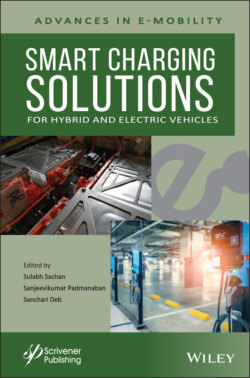Читать книгу Smart Charging Solutions for Hybrid and Electric Vehicles - Группа авторов - Страница 37
1.6 Enablers of Smart Charging
ОглавлениеSmart charging requires enablers to implement it. Consumers and technology are two important enablers. The consumers have a varied aspect of expectations and interpretation for any new technology released in the market. The success and failure of the product depends on the acceptance of consumers. On the other hand, recent times have experienced a rapid transition in technology with new products with desired functionalities released almost daily. The technology required for smart charging should add functionalities that make the system intelligent in operation. Artificial intelligence (AI) and data analytics, popularly called Big Data, are technology enablers [20, 66, 67].
When looking into EV technology, the driving range, charging speed, and availability of charging stations to charge while traveling are the three main constraints for large scale acceptance of electrification of transportation [68]. However, transportation is one of the basic requirements, hence, EV penetration is certain if policymakers’ direct policies that incentivize EV users and manufacturers. The flexibility requirements of each individual will be different, but a customer may compromise if usage results in earning [49, 64, 65, 67]. Apart from policymakers, the PSO should also sincerely participate by giving incentives in electricity pricing for EV users prioritizing coordinated and smart charging. A comprehensive approach to promote the use of EVs should be taken with due consideration of the challenges: driving range, charging time, availability of charging stations, the health of EV batteries, and buying cost of EVs and batteries.
The previous sections and subsections have described the requirements of intelligent systems for the deployment of smart charging architectures. The development of intelligent systems demands data. The data in the electricity grid is generally saved in separate database servers which are used for future planning and expansion of the operation [57, 69, 70]. Hence, designing an intelligent system using AI at the electricity grid side can be attempted, but, when a developer looks to develop intelligent systems for the consumers, lack of data is a big challenge. Hence, the digitalization of the complete smart charging infrastructure can be an initial step to plan for smart charging [67].
Digitalization with an assurance of data analytics can help in developing business models, components, software, and connected hardware and an understanding of the expectations of the consumers. The data logged, when analyzed, can reveal various day and night charging patterns, user preferences, the requirement of power to charge, and various ancillary services that can be attached to EVs [71]. Further, the deployment of communication architecture requires decisions to be made on the communication channel to be used. The data analyzed can also help to provide useful insights to decide the data rate. Based on the data rate, communication channels can be selected. Thus, data analytics and AI are important enablers of the smart charging system.
Apart from technologies that add intelligence, billing and payment services are also an essential part of smart charging systems. Advancements in technologies such as blockchain, which provides secured transactions and maintains a ledger, are being utilized. Blockchains have distributed architectures and the operation is based on secured databases that maintain a record of all transactions. The transactions are verified by the users’ computational or connecting devices (computer, mobile phone, or any smart devices) called nodes. The technology is preferred to be used in smart charging systems due to security and distributed architecture.
Thus, blockchain technology has also emerged as an enabler in smart charging systems [67, 69].
